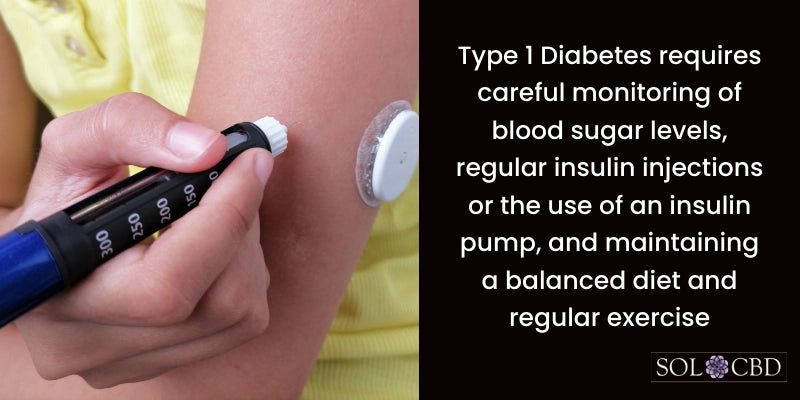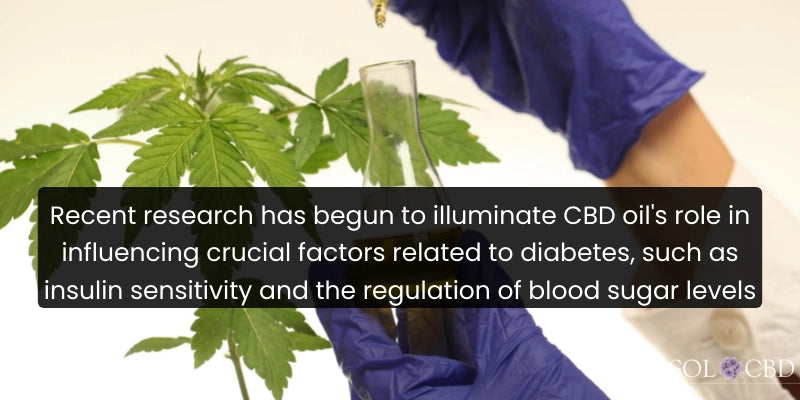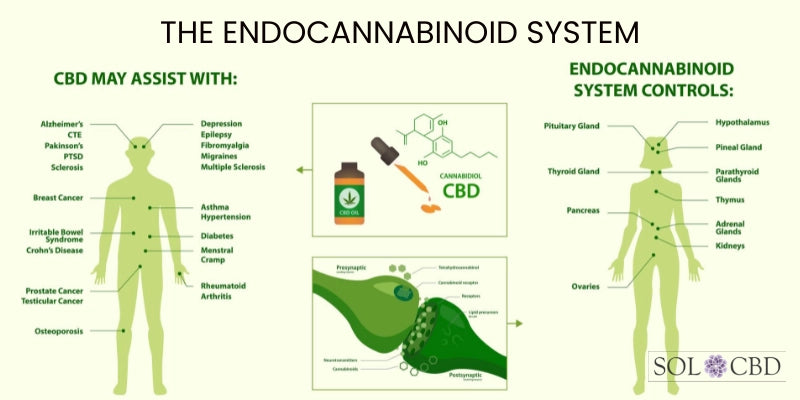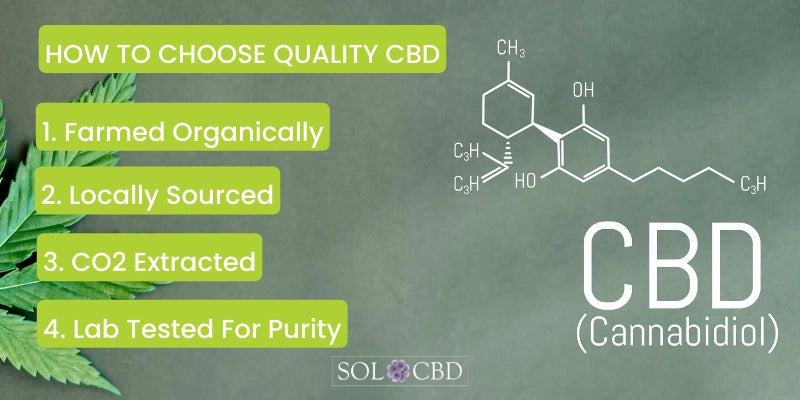In the realm of holistic health and natural wellness solutions, CBD has garnered attention for its therapeutic potential across a wide spectrum of health conditions, including diabetes. With an increasing number of people with diabetes looking for alternative strategies to manage their health, the exploration of CBD's role in diabetes management and blood sugar regulation presents a promising avenue.
Table of Contents
- Understanding Diabetes
- Importance of Blood Sugar Management in Diabetes
- Taking CBD and Blood Sugar Control: Exploring the Connection
- Understanding the Effects of CBD
- How Can People with Diabetes Benefit from CBD?
- Choosing Quality CBD for Health and Wellness
- Conclusion
Understanding Diabetes
Diabetes is a chronic condition that affects the way the body processes blood sugar (glucose), an essential source of energy for the body's cells. When this regulation fails, it leads to elevated blood sugar levels, which can cause a range of health complications over time. There are two principal forms of diabetes, each with distinct causes and management strategies:
Type 1 Diabetes
Type 1 Diabetes is an autoimmune condition in which the body's immune system mistakenly attacks and destroys the insulin-producing beta cells in the pancreas. This results in little to no insulin production, making individuals with Type 1 Diabetes dependent on external sources of insulin to manage their blood sugar levels.
- Causes: The exact cause of Type 1 Diabetes is not fully understood, but it is believed to involve a combination of genetic predisposition and environmental factors that trigger the autoimmune response. The emerging dialogue on CBD and diabetes underscores the importance of further research in this field.
- Management: Managing Type 1 Diabetes requires careful monitoring of blood sugar levels, regular insulin injections or the use of an insulin pump, and maintaining a balanced diet and regular exercise. Emerging research into CBD and diabetes hints at the cannabinoid's therapeutic potential in this area. Continuous education and adjustments are necessary to prevent acute complications like hypoglycemia (low blood sugar) and hyperglycemia (high blood sugar).

Type 2 Diabetes
Type 2 Diabetes is the most common form of diabetes and is characterized by insulin resistance, where the body's cells do not respond effectively to insulin. Over time, the pancreas cannot produce enough insulin to maintain normal blood sugar levels, leading to elevated glucose levels in the bloodstream.
- Causes: Type 2 Diabetes is strongly associated with obesity, sedentary lifestyle, and genetic factors. Unlike Type 1 Diabetes, it often develops in adults over the age of 45, but it is increasingly seen in younger individuals, partly due to rising obesity rates.
- Management: Management of Type 2 Diabetes focuses on lifestyle interventions, such as dietary changes, increased physical activity, and weight loss. Patients with Type 2 are increasingly exploring the potential benefits of incorporating CBD into their management plan. Medications, including oral hypoglycemic agents and sometimes insulin, may also be necessary to help control blood sugar levels. Regular monitoring and healthcare consultations are crucial to adjust the treatment plan as needed and to screen for potential complications.

Importance of Blood Sugar Management in Diabetes
For individuals with either type of diabetes, maintaining blood sugar levels within a target range is essential to prevent complications such as cardiovascular disease, neuropathy (nerve damage), retinopathy (eye damage), and nephropathy (kidney damage). Effective diabetes management involves a comprehensive approach, including diet, exercise, medication, and regular monitoring of blood sugar levels, to reduce the risk of long-term complications and enhance quality of life.

Taking CBD and Blood Sugar Control: Exploring the Connection
Cannabidiol (CBD), a non-psychoactive compound extracted from the cannabis plant, has captivated the scientific community with its potential health benefits, including its ability to combat complications of diabetes. Among these, its anti-inflammatory and antioxidant properties stand out, particularly in the context of diabetes management. Recent research has begun to illuminate CBD oil's role in influencing crucial factors related to diabetes, such as insulin sensitivity and the regulation of blood sugar levels. [1]

Understanding the Effects of CBD
Cannabidiol (CBD) is a fascinating compound that interacts with the body's endocannabinoid system (ECS), a crucial regulatory network that plays a key role in maintaining physiological homeostasis. The ECS comprises cannabinoid receptors, endogenous cannabinoids (endocannabinoids), and enzymes responsible for synthesizing and breaking down endocannabinoids. This system is intricately involved in regulating a multitude of physiological processes, including pain sensation, immune responses, mood, appetite, and importantly for diabetes management, energy metabolism, and insulin sensitivity.
The ECS's involvement in energy metabolism and insulin sensitivity is particularly relevant for understanding CBD's potential impact on diabetes.

Here’s a closer look at how this interaction occurs:
Insulin Sensitivity and CBD
- Enhancing Insulin Sensitivity for People with Type 2 Diabetes: CBD's interaction with the ECS may help enhance insulin sensitivity by promoting a more efficient uptake of glucose by the cells. This is crucial for individuals with diabetes, as improved insulin sensitivity can lead to better control of blood sugar levels, reducing the risk of hyperglycemia and associated complications.
- Mechanisms Behind Improved Insulin Sensitivity: Research suggests that CBD's anti-inflammatory actions can reduce inflammation in the pancreas and the cellular level, potentially protecting pancreatic beta cells that produce insulin. By mitigating inflammation, CBD may help preserve the function of these cells, enhancing insulin sensitivity.
Anti-Inflammatory Action and Diabetes
- Combating Inflammation: Chronic inflammation is closely linked to the development of insulin resistance, a key characteristic of Type 2 diabetes. CBD's anti-inflammatory properties may counteract this by reducing the production of pro-inflammatory cytokines and mediating the immune response, thereby potentially reducing insulin resistance and supporting blood sugar regulation.
Weight Management Through CBD
- Influencing Metabolism and Fat Storage: Obesity, a significant risk factor for Type 2 diabetes, can exacerbate insulin resistance. CBD's potential to influence metabolism and fat storage emerges as a beneficial aspect of diabetes management. Studies indicate that CBD may promote the conversion of white adipose tissue, which stores energy, into brown adipose tissue, which burns energy, highlighting the effects of CBD on metabolic processes relevant to people with type 2 diabetes. This process, known as "browning," can enhance the body's ability to burn calories and regulate weight. [7-11]
- Appetite Suppression: While more research is needed, some evidence suggests that CBD oil may also help suppress appetite, further supporting weight management efforts. Unlike THC, another compound found in cannabis, CBD oil does not typically stimulate appetite, making it a promising adjunct for obesity-related diabetes management. [12]
As the scientific community delves deeper into the potential of CBD for diabetes management, the emerging data on its role in enhancing insulin sensitivity, reducing inflammation, and supporting weight management offers hope for those seeking alternative or complementary treatments. While promising, it is crucial for individuals considering CBD for diabetes management to consult with healthcare professionals and rely on high-quality CBD products as part of a comprehensive care plan.

How Can People with Diabetes Benefit from CBD?
While the potential of CBD in diabetes management is promising, integrating it into your care routine should be approached with careful consideration:
-
Consultation with Healthcare Providers is crucial before diabetic patients decide to take CBD as part of their diabetes treatment plan. Always discuss any changes to your wellness or treatment plan, including the introduction of CBD, with your healthcare provider. They can offer personalized advice based on your health status and current treatments.
-
Quality Matters: Opt for high-quality, lab-tested CBD products to ensure safety and efficacy, especially for diabetic patients seeking to use CBD. Look for products with clear labeling on CBD content and certification from third-party testing.
- Monitoring and Adjustment: Keep a close eye on your blood glucose levels and overall health as you incorporate CBD into your regimen to potentially treat diabetes. Adjustments may be necessary, under the guidance of your healthcare provider, to find the optimal approach for your needs.
Choosing Quality CBD for Health and Wellness
Selecting the right CBD product is crucial for anyone looking to explore its benefits for diabetes management. High-quality CBD products are characterized by their purity, potency, and transparency regarding their sourcing and manufacturing processes. Reputable brands, like SOL CBD, provide detailed information about their products, including third-party lab test results, ensuring you can make informed decisions about incorporating CBD into your diabetes care strategy.
Conclusion
As we continue to explore the myriad health benefits of CBD, its potential role in managing diabetes and supporting blood sugar regulation offers hope for many. With ongoing research and anecdotal evidence pointing towards its beneficial effects, CBD stands out as a valuable addition to holistic health practices aimed at tackling diabetes, potentially helping in diabetes treatment. By choosing high-quality CBD products and working closely with healthcare professionals, individuals with diabetes can safely explore how CBD might complement their existing management plans.
Interested in discovering how CBD can support your diabetes management plan? Explore SOL CBD's range of high-quality products, designed with your health and wellness in mind, especially for those seeking to use CBD to help manage diabetes. Begin your journey towards holistic health today, and remember, always consult with your healthcare provider to ensure the best care for your individual health needs.
Sources
To ensure accuracy and reliability, all references to studies and health claims in this article are based on current research and data available. For further reading and to explore the studies mentioned, please consult the following sources:
- Cannabidiol (CBD) Use in Type 2 Diabetes: A Case Report - PMC (nih.gov)
-
CBD for Type 2 Diabetes: What Are the Benefits and Risks? (everydayhealth.com)
- CBD and Diabetes: Benefits and Precautions (verywellhealth.com)
-
CBD Drug Interactions: Does CBD Interfere with Medication? (creakyjoints.org)
-
Can CBD Help Diabetes? Benefits, Side Effects, Research and More (webmd.com)
-
Cannabidiol promotes browning in 3T3-L1 adipocytes - PubMed (nih.gov)
- Effects of Cannabidiol on Appetite and Body Weight: A Systematic Review - PMC (nih.gov)




























